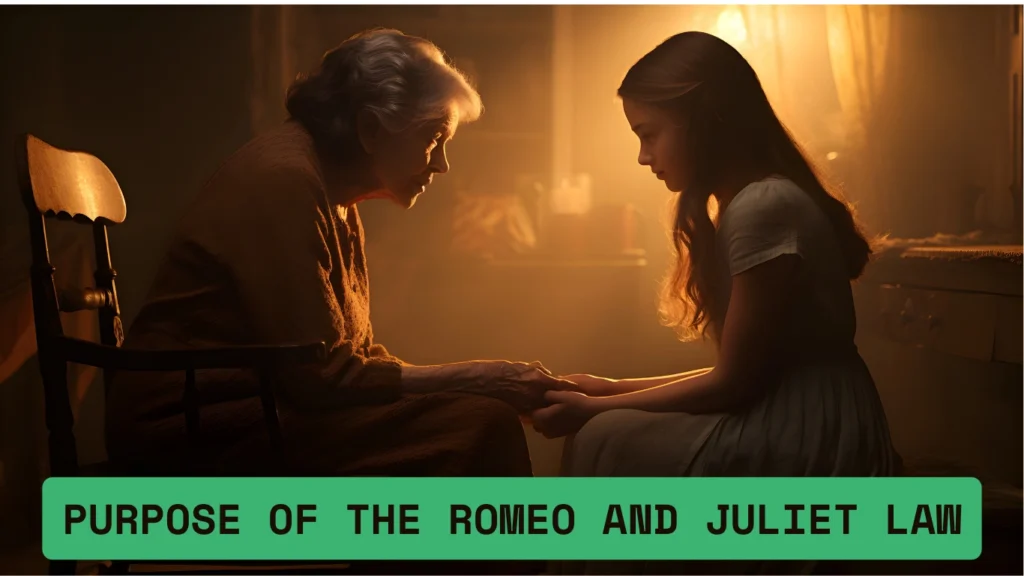What Is the Romeo and Juliet Law and Why Does It Matter?
The Romeo and Juliet law is a legal exception that protects teenagers who engage in consensual sexual relationships from being labeled as sex offenders. These laws are designed to prevent serious legal consequences for young people who are close in age but fall on opposite sides of the age of consent line. In many cases, they reflect an effort to distinguish between exploitation and mutual teenage relationships.
Most people assume that once a minor is involved in any kind of sexual relationship, the older party is automatically guilty of statutory rape. While the law aims to protect minors from adult predators, it can sometimes punish innocent relationships between high school students. That’s where the Juliet law comes in to provide relief in specific close-in-age situations.
Understanding the Purpose of the Romeo and Juliet Law

The Romeo and Juliet exists to create fairness in how statutory rape charges are applied, especially in consensual cases. Imagine a 17-year-old dating a 15-year-old in high school. If they engage in a consensual relationship, the older partner could be criminally charged in some states. However, many lawmakers and courts recognize that such relationships are common and not necessarily abusive.
That is why states have made exceptions to statutory rape laws. They acknowledge that not all age-gap relationships between teens are exploitative. Instead of treating them like serious criminals, the Juliet law allows for reasonable leniency.
How Does It Work in the United States?
Statutory rape laws in the United States are decided at the state level, and so are Juliet laws. Each state sets its own age of consent and rules around close-in-age exemptions. Some allow a defense based on age proximity, while others allow courts to reduce or drop penalties after conviction.
| State | Age of Consent | Max Age Gap Allowed | Additional Notes |
|---|---|---|---|
| Texas | 17 | 3 years | Younger partner must be at least 14; no prior sex offenses |
| Florida | 18 | 7 years (post-conviction) | Allows petition to avoid registration if offender ≤23 |
| California | 18 | 10 years (judge’s choice) | Judges have discretion not to require registration |
| New Jersey | 16 | 4 years | Protects those 13–16 if the partner is not more than 4 years older |
| Canada | 16 (exceptions) | 5 years or 2 years | Applies to partners aged 12–15 with older teens |
These laws vary widely, so knowing your state’s rules is very important. In some areas, a close-in-age relationship might mean no charges. In others, it could still result in criminal prosecution and sex offender registration.
Why the Name “Romeo and Juliet”?
The law is named after William Shakespeare’s tragic play Romeo and Juliet, where two young lovers from feuding families fall in love. Although their story ends in death, the title symbolizes the idea of young love facing social or legal obstacles. In modern law, the name implies that not all teenage relationships are harmful and that sometimes the law should protect rather than punish young people.
While real-life legal cases are far more serious than a story, the symbolic meaning remains. The Romeo and Juliet aims to avoid turning normal teenage behavior into criminal acts that carry life-altering consequences.
The Consequences Without This Law
Without the Juliet law, a teenager in a consensual relationship with a slightly younger partner could face serious punishment. This includes long prison sentences, being labeled as a registered sex offender, and losing future rights like voting, employment opportunities, and even custody of their children.
Here are some common outcomes when a Romeo and Juliet defense is not available:
- Prison sentence ranging from 2 to 20 years
- Permanent criminal record
- Mandatory sex offender registration
- Loss of professional licenses
- Risk of deportation for non-citizens
- Restrictions on where you can live
That’s why legal protections like this law are essential. They offer a balanced approach that still punishes actual predators but defends teens in normal relationships.
Global Perspective: What About Other Countries?
Some countries have adopted similar close-in-age exemptions, though not always under the same name. Here’s a quick look at how it compares globally:
- Canada: Allows 14–15-year-olds to have sex with someone up to 5 years older. Ages 12–13 can consent if the partner is less than 2 years older.
- United Kingdom: The age of consent is 16. There is no formal Juliet law, but prosecutors may consider the relationship context.
- Australia: Varies by state. Most include “similar age” exemptions for those close in age.
- Germany: Allows consensual sex from age 14 if the partner is under 21.
These laws share the same purpose: to avoid criminalizing consensual youth relationships while still protecting minors from abuse.
The Role of the Courts
It’s important to understand that the law often provides a defense, not a guarantee. Law enforcement may still arrest someone if the younger partner is below the age of consent. In such cases, it’s up to the court to determine whether the relationship meets the criteria for the close-in-age exemption.
This makes hiring a qualified attorney very important if someone is facing these charges. A lawyer can help prove the age gap falls within the legal limit and that the relationship was consensual.
Conclusion:
The Romeo and Juliet law is one of the most important legal protections for teenagers in consensual relationships. It provides a safety net for young people whose relationships might otherwise result in unjust criminal charges. These laws don’t give predators a free pass—they offer protection only to those in close, non-coercive relationships.Every state or country must find the right balance between protecting minors and recognizing normal developmental behavior. This law is a step toward a fair legal system that doesn’t punish teenagers for falling in love.
FAQs
Q1: What is the Romeo and Juliet law?
The law protects teens in consensual relationships from statutory rape charges if they are close in age.
Q2: Does every state have a Romeo and Juliet law?
No, not all states have this law. Rules and age gaps vary by state.
Q3: What’s the age gap limit under Romeo and Juliet laws?
It depends on the state. Most allow a gap of 3 to 4 years.
Q4: Can you still be charged under this law?
Yes. It’s a legal defense, not automatic protection. Charges can still be filed.
Q5: Does this law apply to adults with minors?
Only if the adult is within the allowed age gap and the younger person meets the minimum age requirement.






